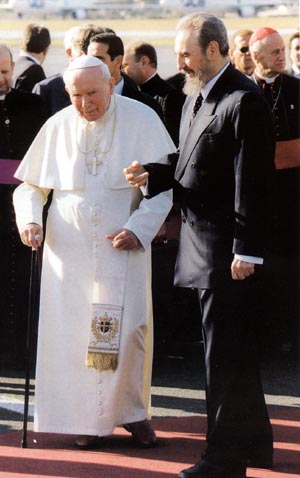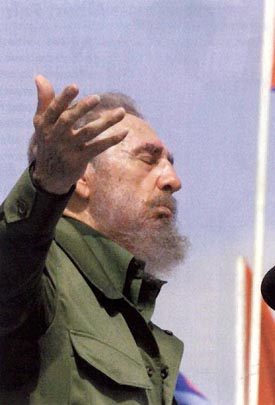 |
International Affairs
The Cuban Fiasco
Atila Sinke Guimarães
One of the most despicable vices of flatterers, in my opinion, is the way they hypocritically conceal the failures of the person they adulate. This applies to the aftermath of John Paul II’s visit to Cuba.

With his visit to Cuba, John Paul II gave new prestige to the worn-out regime of Castro |
I haven’t seen any of his sycophants comment on how his 1998 visit to Cuba came to nothing and backfired. If they were honest, after having extolled the visit as a kind of “new Pentecost” for the Catholics of the island, they would give an objective report of what happened afterwards. But they did not. Most news about the Church in Cuba is hidden, and it is very difficult to find information on what is really occurring today.
As an exception to this rule, the December 18, 2003 issue of Origins published the English translation of a recent pastoral letter that the Cuban Bishops wrote last September 8. I take advantage of it to analyze the reality.
Amid the usual affirmations of principles and manifestations of spiritual hopes, what they wrote portrayed a very depressing situation for Catholics in Cuba. Here I offer some excerpts describing the consequences of the Pope’s visit.
In the first part of their document the Cuban Bishops wrote:
“We have seen how almost immediately thereafter [the visit], the country began an apparent process of revision that did not favor the hopes of pluralism, tolerance and liberalization that seemed to appear on the national horizon. Added to that was a frank reversal in the opening of the economy to the just desires of people with small business, private jobs, etc; the imposition of more taxes, the assessing of high fines, and the denial of permits that discouraged or impeded those economics activities.
“Since the visit of the Pope, Cuba has witnessed an increasing return to the language and methods typical of the first years of the revolution in everything concerning ideology. ….
“We must point out that after the visit of the Holy Father the legitimate requests that were set forth in his speeches and meetings with regard to the Catholic Church are still pending. However, for the Bishops of Cuba these are not the only or the main concerns of the present time when it is evident to us that for many Cubans there is a lack of hope, a daily struggle to survive, and a growing desire to migrate. We are especially worried about the imprisonment and severe sentences imposed on a considerable number of political dissidents as well as the application of death sentences in summary proceedings” (Origins, December 18, 2003, p. 481).
In the last part of their pastoral letter the testimony of the Cuban Prelates is also interesting. They wrote about the relationship between the Communist regime and the Catholic Church:

Did the demogogue, Fidel Castro, fool the Vatican officials and even JPII?
Actualite des Religions, September 2001 |
“We have the impression that in our country there is a subtle struggle against the Church, that she is treated as a private entity or a marginal entity that might drain force or energy away from the revolution. The existence of an office for attention to religious affairs under the central committee of the Communist Party is often seen as an instance of control to limit the Church’s evangelical work and not as an appropriate entity to facilitate in dialogue the review and solution of matters of common interest. ….
“The changes that have taken place in the world, many of them brought about by the decline of ideologies, have not substantially changed the status of religious freedom in our country. The concept of religious freedom continues to be restricted to the area of worship, that is, the relation of the Christian with God, but not in the full and adequate sense of the presence of the Church in the society. …. (Ibid., pp. 484-5)
Close to the end, the Bishops revealed the following short and tragic fact:
“Pope John Paul II came to Cuba as a ‘messenger of truth and hope’ ; paradoxically, since then we feel that the hope of our people has progressively waned” (Ibid., p. 485).
Given the information supplied by this important document, it isn’t difficult to see that the papal trip to Cuba did not produce what the delirious fans of JPII promised it would. It also did not yield what the Pope apparently wanted, that is, a change in the Communist regime. It did not even give any benefit for Catholics. For them the situation continues to be as bad as or even worse than it was before the visit. Therefore, the only party profiting from the visit was Fidel Castro and Communism, which pocketed substantial political advantages, both national and international.
If this picture presented by the Bishops is objective, some questions necessarily arise:
- Was the Vatican so naive as to piously assume that Fidel Castro was changing and heading toward some kind of ideological and religious conversion? It is hard to believe that the Vatican could be so easily fooled.
- But, if it were not fooled, why did the Vatican promote the visit? Was it part of the game to change the bad image of Castro in the West? I don’t know.
The only thing that I know is that if the sycophants of JPII were sincere, now world over they would be bewailing the failure of John Paul II on his Cuban fiasco. But I don’t see any sign of this.

Posted December 31, 2003
International Affairs | Home | Books | CDs | Search | Contact Us | Donate

© 2002- Tradition in Action, Inc. All Rights
Reserved
|
 |
|

|